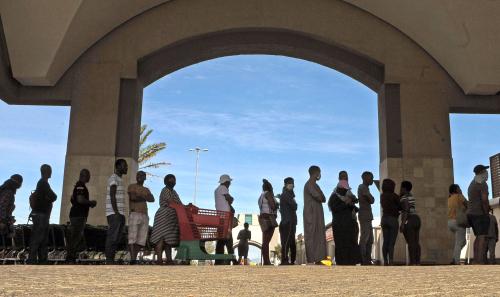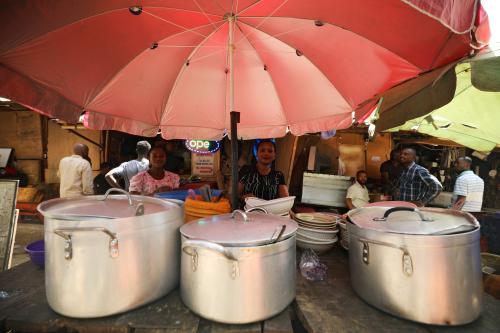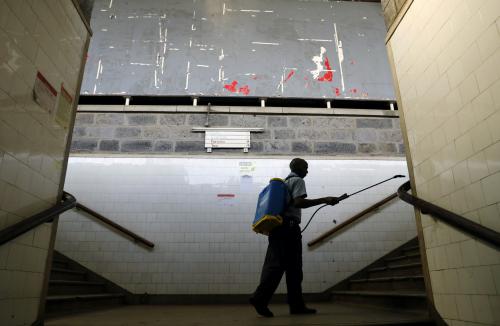African governments begin borrowing from IMF, World Bank to soften hit from COVID-19
This week, several countries and multilateral organizations announced additional measures to combat the economic fallout from COVID-19 in Africa. Among the actions taken by countries, Uganda’s central bank cut its benchmark interest rate by 1 percentage point to 8 percent and directed commercial banks to suspend dividends and bonuses for 90 days. Nigeria’s finance minister announced that the country would request $6.9 billion from multilateral lenders including the International Monetary Fund (IMF), World Bank, and the African Development Bank (AfDB). Ghana’s finance minister, Ken Ofori-Atta, called on China—the region’s largest bilateral lender—to take the lead on debt relief for Africa.
For more on the call for debt relief in Africa, see the recent Project Syndicate piece, “Africa needs debt relief to fight COVID-19” by AGI Director Brahima S. Coulibaly and co-authors.
Among multilateral organizations, the AfDB announced that it had raised $3 billion via a social bond that will be deployed soon to support member countries. The $3 billion bond is the largest single social bond ever issued. The IMF has announced that it has approved $147 million and $109 million in funding for Gabon and Rwanda, respectively. In both countries, the funds are expected to support balance of payments needs and additional government spending to counter the economic slowdown. Late last week, the World Bank announced its first round of funding to support the public health response in Africa, which includes $82 million and $47 million for Ethiopia and the Democratic Republic of the Congo, respectively.
Also this week, the World Bank released its biannual Africa’s Pulse report, which provides an update on the region’s growth prospects. According to the report, sub-Saharan Africa is likely to experience a recession in 2020 with GDP expected to contract somewhere between 2.1 and 5.1 percent. The region’s three largest economies (Angola, Nigeria, and South Africa) are expected to contract by up to 6.9 percent due to their reliance on exports of commodities whose prices have declined and other structural issues. Relatedly, a research note from Goldman Sachs stated that fiscal deficits in Africa are expected to rise to high single digits with aggregate government funding needs rising by about $75 billion this year. According to Goldman Sachs, Angola and Zambia are expected to be the hardest-hit African countries, with their economies predicted to contract by 9 percent.
COVID-19 pandemic affects both politics and daily lives across the continent
On April 7, the number of cases of COVID-19 in Africa officially passed 10,000. Consequences have stretched far beyond economic disruption, with numerous nations implementing major political and societal responses.
Several local and national elections, including those in Ethiopia, Gambia, Zimbabwe, and Nigeria, have been postponed or canceled with a to-be-determined status regarding future rescheduling. In Kenya, on April 6, President Uhuru Kenyatta enhanced travel restrictions, banning traffic for three weeks in and out of capital Nairobi and three other high-density locations. Following the ban, the Kenyatta administration canceled a planned April 7 convening of Kenya’s parliament. In Botswana, the entire parliament has been quarantined for two weeks after the medical worker responsible for testing the members of parliament tested positive for the virus.
In the midst of the pandemic, some government officials in Nigeria, South Africa, Kenya, Malawi, and Rwanda have either forfeited or pledged their salaries to funds supporting the fight against COVID-19. Several public administrations—including the governments of South Africa, Nigeria, and Ghana, are encouraging the use of contactless payment networks (such as mobile money), made possible by the growth of financial technology on the continent in the past decade. The leading mobile money platform in East Africa, M-Pesa, announced a fee waiver for users during the pandemic to help individuals avoid the spread of germs.
Public health responses, led by the World Health Organization (WHO), have utilized the program monitoring infrastructure built by necessity during the Ebola outbreaks of recent years, including communication platforms between health systems and cooperation methods. Weak health systems and hindrances to social distancing measures, however, make public health responses challenging. For more on these issues, see Social distancing unlikely to hold up in Africa without a safety net for microentrepreneurs by Addisu Lashitew and Coronavirus: Amid the global pandemic, lessons for Africa by Yvonne Mburu and Yap Boum II.
Government security forces clash with jihadists in the Sahel
On Monday, April 6, at least 25 Malian soldiers and 12 attackers were killed in a suspected jihadist raid of a military base in the Gao region of northern Mali, though no specific group has claimed responsibility for the attack. Mali’s government has struggled for years to combat several jihadist groups with links to the Islamic State and al-Qaeda, which have been active in northern Mali since 2012 and have spread to the center of the country and to neighboring Burkina Faso and Niger.
In western Niger, near the border with Mali, four soldiers and 63 jihadists were killed on April 2 during fighting between the army and extremists. Since December, at least 174 soldiers have been killed in Niger in several attacks, two of which were claimed by fighters linked to the Islamic State.
In Chad, the army stated that as many as 1,000 Boko Haram fighters and 52 soldiers were killed in an operation that began on March 31. The operation was launched as a result of a March 22 attack by Boko Haram, which killed nearly 100 Chadian soldiers. The Boko Haram insurgency, which began in northeast Nigeria in 2009, has killed more than 30,000 people and displaced nearly 2 million since its inception.







Commentary
Africa in the news: COVID-19 impacts African economies and daily lives; clashes in the Sahel
April 11, 2020